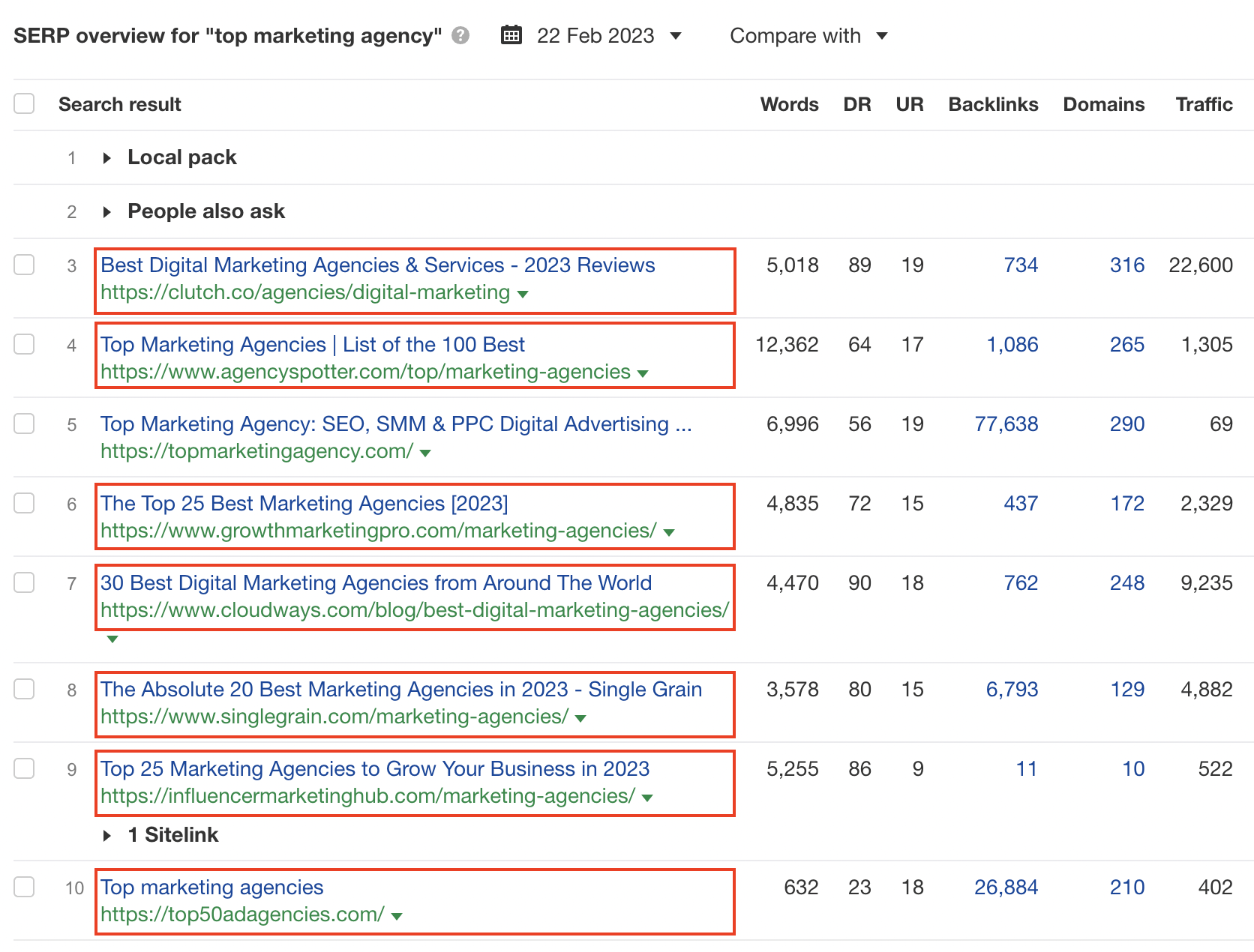SEO is one of the most popular and cost-effective lead-generation channels for B2B.
Nevertheless, leveraging the power of SEO is challenging for some businesses. They believe helpful and optimized content should rank high in search engines, attract the target audience and bring leads. However, it does always happen this way.
SEO is an art and a science at the same time.
Even if you follow popular SEO strategies that are believed should work, positive results are not granted. However, you can increase the likelihood of success by avoiding common SEO mistakes that can prevent your business from generating leads from organic search results.
Here are five SEO mistakes to watch out for.
1. Ignoring Search Intent
Search intent is the “why” behind users’ queries. It explains why users go to search engines and type their queries.
Since search engines aim to display the most relevant results for a particular moment in time, your content should be the most relevant to users’ search queries. In other words, your content should satisfy users’ search intent.
So if you, as a B2B company, want to rank for the “top marketing agency” keyword, don’t try to shoehorn your company’s home or landing page into a search engine result page (SERP). It won’t work. Google’s SERP is dominated by listicles because Google knows that users want to compare options first without purchasing anything. Therefore, the content format that has the highest potential to rank on top is an informative blog post.
If you don’t consider search intent while creating content for your business, it’s time to start doing it! A quick SERP analysis will help you understand the most relevant content type and format for your target keyword.

2. Focusing On Keywords Without Business Potential
Ahrefs’ CMO, Tim Soulo, has made a good point many businesses fail to understand and implement:
“The primary goal of growing a blog is acquiring new customers. Treat your blog as a customer acquisition channel, not a traffic acquisition channel.”
It is valid not only for blogging websites but also for business websites.
Focusing on random keywords might bring some traffic to your website, but it won’t help you achieve your business goals — generating leads. Therefore, mind the keywords you target on your website.
While prioritizing keywords, assign a score from 0 to 3 depending on how easy it will be to pitch your product or service while covering a given keyword.
Let me give you a quick example.
If you run an SEO agency, then keywords such as “SEO strategy,” “how to rank on top,” and “on-page optimization tips” are relevant for your business. You can directly feature your company and services in the content. For example, check how this SEO expert leverages the power of on-page optimization to promote SEO blog writing services here. This way, users interested in this service can discover it in organic search results and reach out for help.
3. Writing Boring Title Tags
A title tag is used to specify the title of a webpage and is usually shown in search results like this:
<title> 10 Best SEO Services (March 2023) – Forbes Advisor </title>

Writing attention-grabbing and promising title tags is important for several reasons.
First, your content piece competes with nine more results on the first search engine result page. No one will want to open it if the title tag is boring. Potential customers might choose your competitors over your website if competitors’ title tags are attractive.
Secondly, title tags are a confirmed ranking factor!
John Mueller, Google’s advocate, explained the role of a title the following:
“One of the things I think is worthwhile to keep in mind is we do use titles as a tiny factor in our rankings as well.”
Whenever you write a title tag for any website page, don’t make it dull and unoptimized. Instead, your title tag should hook your target audience to click.
Here are a few tips on how to create an ideal title tag:
- Keep it under 60 characters. Otherwise, Google can rewrite your title tag.
- Include your target keyword.
- Include the year to indicate that your content is fresh ( “updated for 2023” or “in 2023”).
- Use symbols to save space (& instead of “and”).
- Try to communicate what is unique about your content right in the title.
- Use numbers (“top 20 agencies”).
- Use power words to evoke emotions.
4. Not Promoting Your Business In The Content
Every content piece is created for a reason.
Your company may want to communicate its updates through content, increase brand awareness or generate leads.
If your goal is to acquire potential customers through optimized content, you can achieve it by doing the following:
- Targeting keywords with business potential (covered earlier in the article).
- Communicating how your business can help people solve their problems.
The second point is as important as the first one.
Without featuring your business in your content and explaining how it can be helpful, there is a low chance people will buy from you. If they don’t find the solution to their problems on your website, they will go to your competitors.
Here is how you can create content that natively promotes your business:
- Write expert blog posts on behalf of your team members. This way, your content will look more trustworthy (for example, a design topic is written and explained by a designer).
- Feature your company in the content.
- Say a few words about your team (who works in your team, what’s their expertise, what’s unique about your team, attach a photo if you’d like to).
- Share success stories of how your company helps other businesses thrive.
- Show the impact of your work so your potential clients will want to achieve similar results with your help.
- Include in-text CTAs and banners to drive action.
Even if you write informational blog posts, including a few promotional elements will help direct your potential customers to get in touch with you.
5. Not Updating Old Content
Refreshing outdated content is an overlooked SEO strategy I don’t see many companies doing. There might be several reasons for it:
- Priority is always given to new content.
- Updating old content requires time and resources.
If your main lead generation web pages were posted over a year ago, you could boost their performance by refreshing old content. As a result, you may observe increased impressions and the number of ranking keywords, traffic, and rankings improvement.
It’s important to mention that this strategy works for websites with middle and low domain ratings (DR) too!
If you wonder how to improve your website’s performance to get more traffic and generate leads, consider updating some old web pages that have business potential. Since users and Google favor fresh content, it will help you improve your website’s performance without additional investment into new content.
Here is what to pay attention to when updating old content:
- Search intent. Analyze the content format of top-ranking web pages to ensure your updated web page will align with search intent.
- Content length. If most top-ranking pages have 2,000+ words, it’s a sign that your content should be at least as long.
- Keywords. Conduct a content gap analysis to discover keywords your competitors rank for, but you don’t. Ensure you include these keywords in your updated content.
- Update the meta title and description to help it stand out among top-ranking content. If they are not optimized, include your target keyword.
In Conclusion
Implementing recommendations from this article can help you boost your website’s performance, attract the target audience, and generate leads from organic search.
Remember, SEO is no longer about keyword stuffing and buying backlinks. Google has launched multiple algorithm updates to identify AI-generated content and content created for ranking purposes only.
If you want to succeed in SEO, you’ll have to create original, high-quality, people-first content that demonstrates E-E-A-T.
The post 5 SEO Mistakes To Avoid If You Want To Generate Leads From Organic Search Results appeared first on Social Media Magazine.

